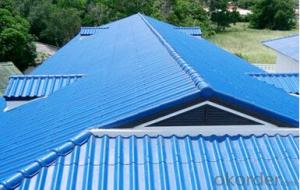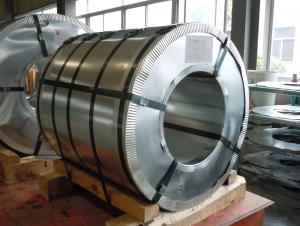PPGI 0.16-0.6mm 700-1250mm various color coated PPGI/PPGI steel coil cheap price
- Loading Port:
- Tianjin
- Payment Terms:
- TT OR LC
- Min Order Qty:
- 50 m.t.
- Supply Capability:
- 10000 m.t./month
OKorder Service Pledge
OKorder Financial Service
You Might Also Like

Prepainted galvanized color coated PPGI steel:
1.Specification .
| Raw material | SGCC, SPCC, DC51D, SGHC,A653 |
| Certificate | ISO9001.ISO14001.OHSAS18001 |
| Thickness | 0.16mm-1.5mm |
| Width | 1250mm or under |
| Tolerance | thickness+/-0.01mm |
| Surface treatment | galvanized / galvalumized steel sheets |
T Bending (top-coating) T Bending (back-coating) | ≤3T ≤4T |
| Anti-MEK Wiping | ≥100times |
| Zinc coating | 40-180g |
| Type of coating structure | 2/1 or 2/2 coating, or customized |
| Standard | GB/T12754-2006, GB/T9761-1988, GB/T9754-1988, GB/T6739-1996, HG/T3830-2006, HG/T3830-2006, GB/T1732-93, GB/T9286-1998, GB/T1771-1991, GB/T14522-93 |
| Color | customized |
| Application | Building industry ,structural use, roofing, commercial use ,household appliance,industry facilities,office buildings |
2.Mechenical property.
Chemical Composition | ||||||
GRADE | C | Si | Mn | P | S | Ti |
SGCC/DX51D+Z | ≤0.10 | ≤0.50 | ≤0.60 | ≤0.10 | ≤0.030 | ≤0.020 |
DX52D+Z | ≤0.10 | ≤0.50 | ≤0.60 | ≤0.10 | ≤0.030 | ≤0.020 |
SGCD/DX53D+Z | ≤0.10 | ≤0.30 | ≤0.50 | ≤0.05 | ≤0.030 | ≤0.020 |
SGCE/DX54D+Z | ≤0.10 | ≤0.30 | ≤0.30 | ≤0.03 | ≤0.020 | ≤0.020 |
DX56D+Z | ≤0.10 | ≤0.30 | ≤0.30 | ≤0.03 | ≤0.020 | ≤0.020 |
Structural | ≤0.20 | ≤0.60 | ≤1.70 | ≤0.10 | ≤0.045 | |
Mechanical Properties | ||||||
GRADE | Yield Strength MPa | Tensile Strength MPa | Elongation % | |||
SGCC(DX51D+Z) | ≥205 | ≥270 | - | |||
SGCD(DX53D+Z) | - | ≥270 | 38 | |||
SGCE(DX54D+Z) | - | ≥270 | 40 | |||
DX56D+Z | - | ≥270 | 42 | |||
3.Production process
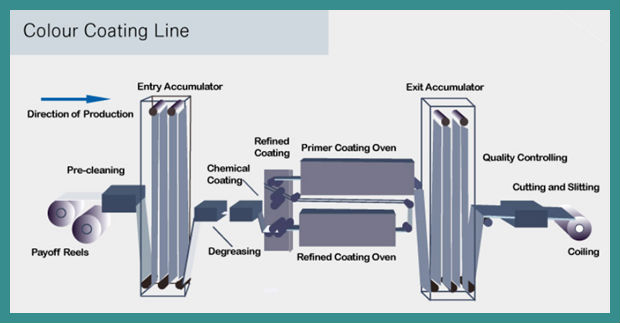
4 Sectional Structure of PPGI coil
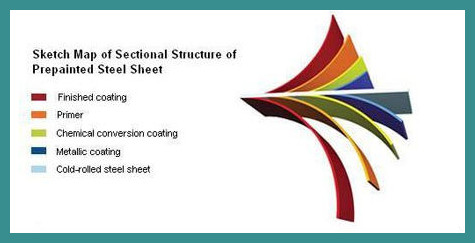
5.Container information
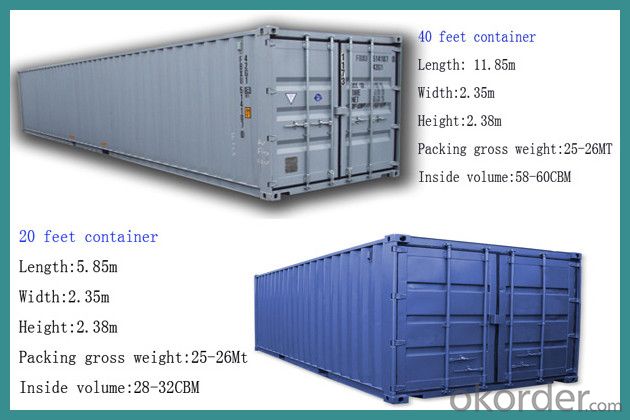
- Q:What are the different steel coil packaging methods?
- There are several different steel coil packaging methods, including using steel strapping, wrapping with plastic or stretch film, placing the coils in wooden crates, or using steel coil sleeves or eye-to-sky packaging.
- Q:How are steel coils used in the production of industrial valves?
- Steel coils are used in the production of industrial valves as they are typically cut and formed into various components, such as valve bodies and stems. The coils provide a strong and durable material for the valves, ensuring their reliability and longevity in industrial applications.
- Q:What are the advantages of using steel coils over other materials?
- There are several advantages of using steel coils over other materials. Firstly, steel is highly durable and has a long lifespan, making it ideal for various applications. Secondly, steel coils have excellent strength and can withstand heavy loads and extreme weather conditions. Thirdly, steel is recyclable and environmentally friendly, ensuring sustainability. Additionally, steel coils provide superior corrosion resistance, reducing maintenance costs. Lastly, steel offers versatility in terms of customization, allowing for various shapes, sizes, and thicknesses to meet specific requirements.
- Q:What are the different types of steel alloys used in coils?
- There are several different types of steel alloys commonly used in coils, each with its own unique properties and characteristics. Some of the most common types include: 1. Carbon Steel: This is the most basic and widely used type of steel alloy in coils. It contains a low amount of carbon and is known for its strength and durability. Carbon steel coils are often used in applications where high strength is required, such as automotive parts, construction materials, and machinery components. 2. Stainless Steel: Stainless steel coils are made from an alloy of iron, chromium, and other elements. They are highly corrosion-resistant and have excellent strength and heat resistance properties. Stainless steel coils are commonly used in applications where resistance to corrosion and staining is important, such as kitchen appliances, medical equipment, and transportation components. 3. Galvanized Steel: Galvanized steel coils are made by coating regular carbon steel with a layer of zinc. This coating provides excellent corrosion resistance and protects the underlying steel from rusting. Galvanized steel coils are commonly used in outdoor applications, such as roofing, fencing, and automotive body parts. 4. Alloy Steel: Alloy steel coils are made by adding various alloying elements, such as manganese, nickel, chromium, or molybdenum, to carbon steel. This enhances the strength, hardness, and wear resistance of the steel. Alloy steel coils are often used in applications where high strength and toughness are required, such as in the manufacturing of machinery, tools, and construction equipment. 5. Electrical Steel: Electrical steel coils are specifically designed for use in electrical equipment, such as transformers and electric motors. They have low electrical resistance and high magnetic permeability, allowing them to efficiently conduct electricity and create magnetic fields. Electrical steel coils are typically made from a silicon alloy, which improves their electrical and magnetic properties. Overall, the choice of steel alloy for coils depends on the specific requirements of the application, such as strength, corrosion resistance, electrical conductivity, or heat resistance.
- Q:What are the common methods of protecting steel coils from corrosion during storage?
- There are several common methods used to protect steel coils from corrosion during storage. These methods are employed to prevent moisture and other environmental elements from coming into contact with the steel coils, which can lead to corrosion. 1. VCI (Volatile Corrosion Inhibitor) Packaging: VCI packaging is a widely used method for protecting steel coils. VCI materials are incorporated into the packaging, such as plastic bags or films, which release a vapor that forms a protective layer on the surface of the steel coils. This layer prevents moisture and other corrosive agents from reaching the steel, thus inhibiting corrosion. 2. Oil Coating: Another widely used method is to apply a thin layer of oil on the surface of the steel coils. The oil acts as a barrier, preventing moisture and oxygen from coming into contact with the steel. This method is particularly effective for long-term storage or transportation of steel coils. 3. Desiccants: Desiccants, such as silica gel packets, can be placed inside the packaging to absorb any moisture that may be present. By reducing the humidity levels inside the packaging, the risk of corrosion is minimized. This method is often used in conjunction with VCI packaging or oil coating. 4. Proper Ventilation: Adequate ventilation is necessary to prevent the accumulation of moisture around the steel coils during storage. By allowing air to circulate freely, it helps to reduce the humidity levels and prevents the formation of condensation, which can lead to corrosion. 5. Controlled Environment: Storing steel coils in a controlled environment can be an effective way to prevent corrosion. This involves maintaining a constant temperature and humidity level, which are not conducive to corrosion. Temperature and humidity control can be achieved through the use of air conditioning or dehumidification systems. It is important to note that the specific method or combination of methods used to protect steel coils will depend on various factors, such as the duration of storage, the environmental conditions, and the specific requirements of the steel coils. Regular inspections and maintenance are also crucial to ensure the ongoing protection of the steel coils from corrosion.
- Q:What are the dimensions of steel coils used in bridge construction?
- The dimensions of steel coils used in bridge construction can vary depending on the specific requirements of the project. However, typical dimensions for steel coils used in bridge construction range from 0.5 to 2 inches in thickness and 24 to 72 inches in width.
- Q:Hi can someone help me pleaseis there any available data for mechanical behaviour of recycled steel, i need to compare them with new steel.
- Most recycled steel is blended with new steel at the steel mill. Scrap steel that is reused directly doesn't change it properties because it has been used. That is unless it has been in certain environments such as ones with hydrogen, hydrogen sulfide etc. Then the steel can become brittle. You might look for information on the National Association of Corrosion Engineers (NACE). They have lots of information on metals and what causes problems.
- Q:Have spent two days making a specialized knife out of 304 stainless steel, after throwing into a log it bent slightly arghhhh. Is it worth continuing to finish it off or start all over again with different kind of steel if so which kind should i use.
- Sorry okorder /... I hope that link works but as you can see you dont want to use 303.304.316,410,416,430 You can get away with 301 but would be best to use 440. It kind of sounds like your a home shop guy. It would be best for you to make a knife out of a1 or d2 tool steel. with these steels you can torch heat them to a red hot heat where a magnet will not stick to them. Then let them cool slowly in the air. After that you can temper in a oven around 400f. This will a very hard long lasting knife. Check OKorder for good steel prices. A1 and D2 are not stainless but they are the best for a home shop. If you go stainless you can buy preharden material but you will have to grind everything. You can also pay someone to harden your knife but dont plan on it being cheap.
- Q:I am refinishing a table and on my can of polyurethane, it indicates not to sand with steel wool prior to application. Why is that?
- it can turn dark! use 400 to 600grit wetdry sandpaper watch your edges!!!
- Q:How are steel coils used in the production of structural components?
- Steel coils are an integral part of the production process for structural components. These coils, which are made of steel that has been rolled into a continuous strip, provide the raw material necessary for manufacturing a variety of structural components, such as beams, columns, and trusses. The first step in using steel coils for structural components involves uncoiling the strip and cutting it into the desired lengths. This can be done using a variety of cutting methods, such as shearing or sawing. Once the coils are cut into lengths, they are then processed further to shape them into the specific structural components needed for a particular project. One common method used to shape steel coils into structural components is through the process of bending or forming. This involves using specialized machinery to bend or shape the steel into the desired configuration. For example, a steel coil can be bent into an I-beam shape, which is commonly used as a load-bearing structural component in buildings and bridges. Another method used to shape steel coils into structural components is through the process of welding. This involves joining multiple steel coils together to create a larger component. Welding is often used to fabricate components such as columns or trusses, which require the combination of multiple steel coils to achieve the necessary strength and structural integrity. Once the steel coils have been shaped and formed into the desired structural components, they may undergo additional processes, such as surface treatment or coating, to enhance their durability and resistance to corrosion. This ensures that the components will have a long lifespan and can withstand the demands of their intended applications. In summary, steel coils are essential in the production of structural components as they provide the raw material necessary for manufacturing. Through processes such as cutting, bending, and welding, steel coils are shaped into the specific components needed for various construction projects. These components play a crucial role in supporting the structural integrity of buildings, bridges, and other structures.
1. Manufacturer Overview |
|
|---|---|
| Location | |
| Year Established | |
| Annual Output Value | |
| Main Markets | |
| Company Certifications | |
2. Manufacturer Certificates |
|
|---|---|
| a) Certification Name | |
| Range | |
| Reference | |
| Validity Period | |
3. Manufacturer Capability |
|
|---|---|
| a)Trade Capacity | |
| Nearest Port | |
| Export Percentage | |
| No.of Employees in Trade Department | |
| Language Spoken: | |
| b)Factory Information | |
| Factory Size: | |
| No. of Production Lines | |
| Contract Manufacturing | |
| Product Price Range | |
Send your message to us
PPGI 0.16-0.6mm 700-1250mm various color coated PPGI/PPGI steel coil cheap price
- Loading Port:
- Tianjin
- Payment Terms:
- TT OR LC
- Min Order Qty:
- 50 m.t.
- Supply Capability:
- 10000 m.t./month
OKorder Service Pledge
OKorder Financial Service
Similar products
New products
Hot products
Related keywords
